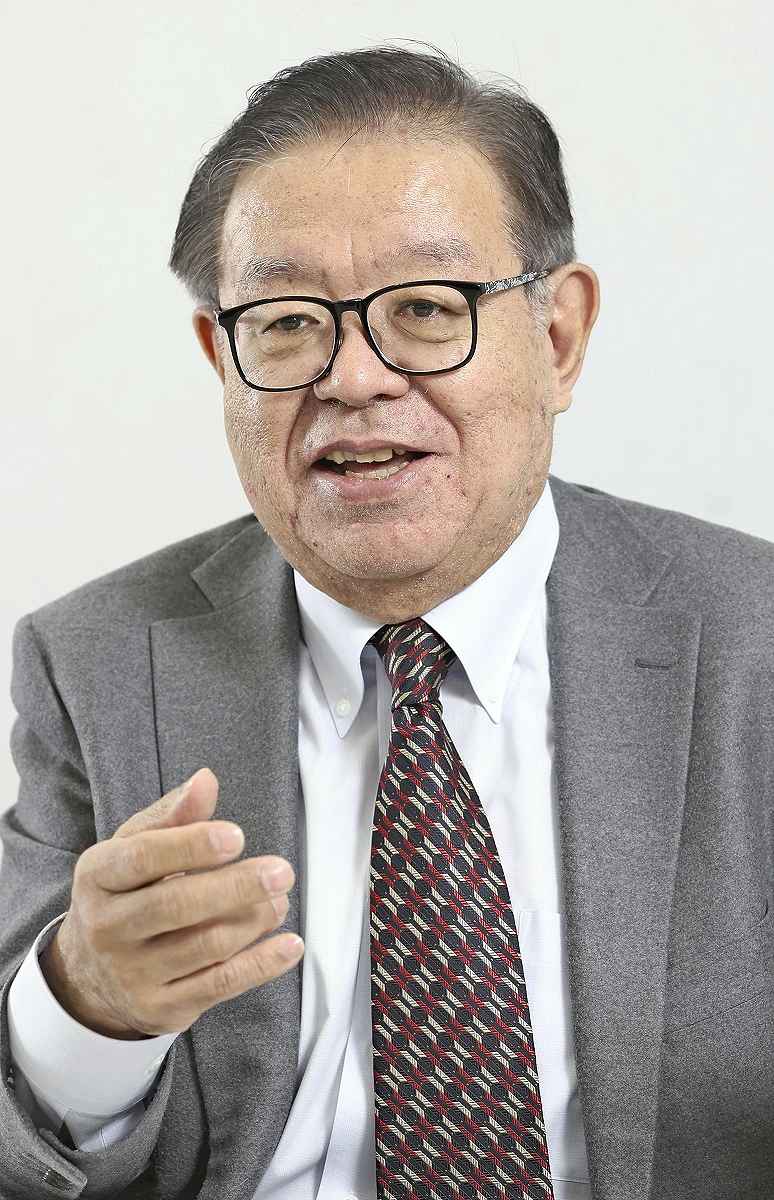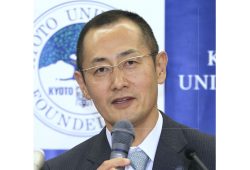
Jun Murai, Keio University Professor
12:56 JST, January 14, 2021
This is the sixth installment of a series in which intellectuals share their thoughts on political issues the administration of Yoshihide Suga will tackle this year. For this installment, The Yomiuri Shimbun interviewed Jun Murai, special advisor to the Cabinet in charge of digital policy. The following is excerpted from the interview.
Due to the novel coronavirus pandemic, many people in Japan have been working, shopping, taking classes and doing other activities online.
People are sending and receiving huge amounts of video content, but the optical fiber networks that connect the country have not failed. This has demonstrated the quality of Japan’s information and communications infrastructure. Now we have to promote utilization so everyone can benefit.
Some local governments have halted online applications for government assistance during the pandemic, illustrating the slow progress in digitizing administrative services. The first thing we need to do is change administrative systems. Initially this will be costly and the reforms could be difficult, but it is essential that we proceed with digital reforms now.
Soon after the launch of his Cabinet, Prime Minister Yoshihide Suga called me to talk about his approach to digital policy. We met at a hotel in Tokyo on Sept. 20, where I told him two things. First was that in the 20 years since the basic law on information technology was enacted in 2000, there has been almost no progress in digitalizing administrative services. This needs to be completed with a great deal of determination.
Second was the importance of the prime minister’s decision-making. He needs to give clear deadlines for what needs to be done by when.
■Learn from success
There have been examples of successful digital transformations (see below) in Japan, in which new value was created by making use of digital technology. The most successful was the full transition to terrestrial digital broadcasting in 2011.
In 2001, it was decided that analog broadcasts would stop 10 years later. To this end, various policies were introduced to encourage people to buy new televisions, such as the eco-point system. And consultation centers were set up in various places to help the elderly.
Political leaders set a deadline, and everyone cooperated to make the transformation a success. Digital policies such as the My Number system will never work unless a similar approach is taken.
■Authority and responsibility
Amid this state of affairs, Suga announced that a digital agency would be created in 2021.
I chaired a government working group that put together recommendations. Our main points were “information accessibility (ease of use),” “leave no one behind” and “make good use of technology.”
In other words, we need a digital society that is kind to the elderly and people with disabilities, and that leaves no one behind. These recommendations were reflected in the basic guidelines for the agency.
Giving the agency both the authority and responsibility of a command center will be key to its success. If each ministry, agency and municipality promotes digitalization separately, it will not be effective. It is important for both Kasumigaseki and regional areas to listen to the agency, and to build a framework in which the agency can take responsibility if problems arise.
Private sector figures who are hired to fill top administrative posts at the agency will need to have experience in successfully taking responsibility and getting things done on their own. The right people would be those who have changed the world by launching products such as software or systems used by many people.
Government-created apps need to be easy to use, even for elderly people who are new to the digital world.
The My Number website has been unpopular for being difficult to use. Procedures should be able to be completed with a single click, even with a smartphone, and people who do not have smartphones should be able to use them simply by talking through a speaker.
Digitization is not for moving society, but for each and every human being.
— This interview was conducted by Yomiuri Shimbun Staff Writer Koichiro Shigematsu
Jun Murai, 65
Keio University Professor
Born in Tokyo in 1955, he is a doctor of engineering who specializes in information networks. He has been called “the father of the Japanese internet” for his efforts to improve and spread internet networks, and was appointed special advisor in charge of digital policy to the Cabinet of Prime Minister Yoshihide Suga. He was also involved in the passing of the basic law on information technology.
The use of data and digital technology to streamline production and operations, and change the face of companies and society. It is often abbreviated as DX, using the “D” from digital and X for “transformation.”
10 mil. elderly need support
Suga’s digital agency is preparing for its inauguration on Sept. 1.
The government will submit the relevant legislation to the upcoming Diet session, which is scheduled to convene on Jan. 18.
The agency will be under the direct control of the prime minister and have a staff of around 500 people. Special “digital supervisors” from the private sector will be assigned to top administrative posts.
More than 100 specialized professionals are to be hired from the private sector, with the goal of digitalizing society through a united public-private effort.
The basic guidelines for the agency, which were approved by the Cabinet on Dec. 25, state that it should aim for “a diverse and happy society in which individuals can select services that meet their needs through digital technology.”
According to data from the Internal Affairs and Communications Ministry, about 10 million elderly people need assistance using digital devices.
Next fiscal year, the government will start holding seminars on administrative procedures that can be carried out using smartphones and tablets at about 1,000 locations nationwide, aiming to eliminate the digital divide.
Top Articles in Politics
-

LDP Wins Historic Landslide Victory
-

LDP Wins Landslide Victory, Secures Single-party Majority; Ruling Coalition with JIP Poised to Secure Over 300 seats (UPDATE 1)
-

Japan Tourism Agency Calls for Strengthening Measures Against Overtourism
-

CRA Leadership Election Will Center on Party Rebuilding; Lower House Defeat Leaves Divisions among Former CDPJ, Komeito Members
-

Voters Using AI to Choose Candidates in Japan’s Upcoming General Election; ChatGPT, Other AI Services Found Providing Incorrect Information
JN ACCESS RANKING
-

Japan Institute to Use Domestic Commercial Optical Lattice Clock to Set Japan Standard Time
-

Israeli Ambassador to Japan Speaks about Japan’s Role in the Reconstruction of Gaza
-

Man Infected with Measles May Have Come in Contact with Many People in Tokyo, Went to Store, Restaurant Around When Symptoms Emerged
-

Prudential Life Insurance Plans to Fully Compensate for Damages Caused by Fraudulent Actions Without Waiting for Third-Party Committee Review
-

Woman with Measles Visited Hospital in Tokyo Multiple Times Before Being Diagnosed with Disease


























